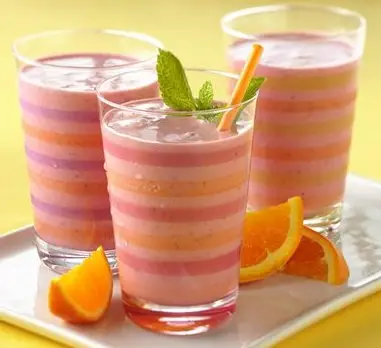A smoothie is a thick blended beverage with shake like consistency, normally pureed in a blender containing fruits and/or vegetables as well as an added liquid such as fruit juice, vegetable juice, milk, or even yogurt
Growing on their popularity because of their high nutritional values, freshness and good taste smoothies are becoming increasingly widespread in the food industry. But are industrially prepared smoothies still as beneficial to our health as freshly made smoothies? Researches on this topic showed that this is not the case.
Different types of Smoothies
Fruit Smoothies: A smoothie made from all sorts of fruits. Try out our fruit smoothie
Green Smoothies: Smoothies typically dark green in color which is due to their use of dark vegetable greens such as collard greens, chard, spinach etc. Try out our mixed fruit and vegetables smoothie.
Healthy Smoothies: Any smoothie whose aim is to optimize the amount of nutritional intake, with the goal of replacing supplements and providing all of one’s daily recommended vitamins and macro-nutrients in a natural form.
Full smoothies:Smoothies including all nutrients needed (fats, carbs, proteins, vitamins, minerals, fibers). Such smoothie can replace your meal easily. A good example of universal smoothie would be our cottage cheese smoothie.
Weight Loss Smoothies: These exclude any added sugar, and often contain healthy fats such as flax seed or almond butter in order to help satiate one’s appetite.
Dessert Smoothies: Dessert smoothies typically contain added sugar or fat in the form of ice cream or syrups which in many cases tastes identical to a shake. Give our delicious smoothie a try.
Freshly made vs industrially prepared smoothies.
Fresh fruit and vegetable are an important source of vitamins, minerals and fiber, but when they are processed, little remains of vitamins. In some products fibers are also lacking; for example in juices there are hardly any nutrients.
The fact is that industrially prepared and prepackaged smoothies are made from fresh fruit, but the mixture is already processed and made from concentrated fruit and vegetable juices and purees.
As the final product it is heat treated again and therefore there is hardly any more of vitamin C and vitamin B complex as well as other heat-sensitive secondary plant substances (such as antioxidants and polyphenols).
 Freshly made smoothies are always a better choice over industrially prepared smoothies.
Freshly made smoothies are always a better choice over industrially prepared smoothies.That is why it is so important that we consume freshly made smoothies which are quality drinks.
Despite all that, you have to be careful not to consume excessive amounts of fruit smoothies, because due to their high sugar content their nutritional value is correspondingly high as well.
Tips considering smoothies
1. Recommended daily intake is 10 oz/ 300g of fruit and 14 oz/ 400g vegetable, which means your vegetable intake has to be bigger than fruit intake because it contains more fiber and less sugar.
2. At least half of the recommended amount should be fresh (unprocessed) fruits and vegetables of different colors and textures.
3. If you have to drink industrially prepared smoothies (e.g. due to lack of time preparing fresh smoothies), minimize their intake and dilute with water.
4. Nutrition experts recommend only three ounces/ one deciliter industrialized juice daily.
5. When buying smoothie always look at the nutritional chart to see how much sugar and fiber it contains.









































